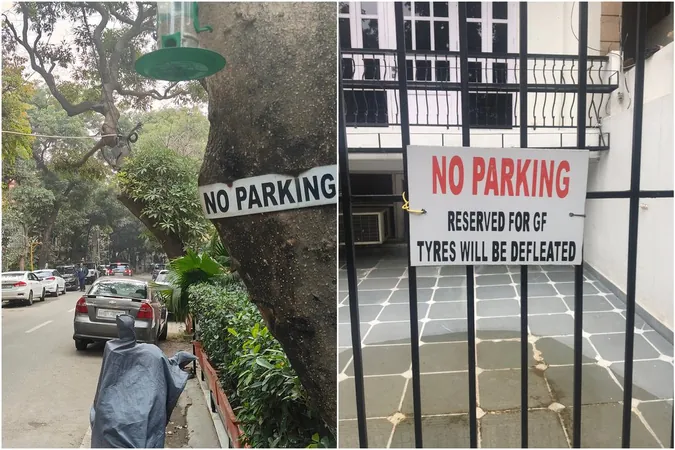
Parking Wars: The Battleground of Urban India – Why Car Owners are at Each Other's Throats
2025-01-06
Author: Arjun
Introduction
Finding a parking spot in Indian cities has become an all-too-common struggle, with car owners resorting to aggressive measures in the face of scarcity. In upscale neighborhoods like Vasant Kunj in South Delhi, the situation is particularly dire, as residents navigate a maze of gated compounds without designated parking.
The Escalation of Aggression
Private tutor Dahlia Sen Joshi, 50, relies on her Renault Kiger for her daily rounds, but the lack of parking often forces her to park on public roads, where she risks vandalism from locals frustrated by her presence. "The level of aggression has escalated; if you park in their spot, even for an hour, they’ll scratch your car or slash your tyres," she laments.
A Growing Problem in Urban India
This ongoing battle for parking space highlights not only the inconvenience but also the escalation of violence surrounding the issue. Social media is rife with videos capturing these dramatic confrontations, including a chilling clip from 2023 of a man viciously attacking another during a parking dispute in Delhi.
Vehicle Ownership vs. Parking Solutions
The problem stems from the rapid increase in private vehicle ownership coupled with inadequate parking solutions in Indian cities. As of March 2023, Delhi alone had nearly 8 million vehicles, with 1,800 new cars hitting the streets daily. "Delhi simply cannot sustain this number of cars," warns Shubham Srivastava from the Centre for Science and Environment. "These vehicles need parking space, which is in short supply."
Urban Transformation and its Consequences
As the population of Delhi surged from 13.85 million in 2001 to over 20 million today, the urban landscape transformed dramatically. Single-family homes are replaced by multi-story buildings, often housing families with multiple vehicles yet no accompanying parking facilities.
Rise in Violent Parking Disputes
Reports of violent parking disputes have spiked, with Delhi police recording over 7,300 calls related to parking violence between January and October 2023—surpassing the total for the previous two years combined. Similar troubling incidents have occurred in other cities like Bengaluru and Mumbai, where disagreements over parking have turned deadly.
Extreme Measures by Residents
Residents have resorted to extreme measures like blocking public road spaces with flower pots and threatening signage, forcing many to endure thefts and damages to their vehicles. "When I lived in a neighborhood with no allocated tenant parking, my small car's battery was stolen multiple times," recounts finance professional Shiv Kumar Sharma. He now prioritizes safe parking in his new home.
Need for Drastic Action
Despite regulations mandating parking provisions in newer buildings, enforcement remains lax. "We need drastic action," says Atul Goyal, president of a residents' association in Delhi. He suggests introducing limits on the number of vehicles per household.
Challenges in Infrastructure Development
The slow development of multi-level parking in commercial areas exacerbates the issue, as does the culture of free roadside parking, which blocks pedestrian access. Political inertia has stalled progress on implementing a proposal to charge for roadside parking— a move met with public resistance.
Changing Mindsets
Experts agree that a change in mindset is necessary. "We need to dispel the idea that public streets are free for parking," urges Sonal Shah, executive director of a non-profit focused on urban development. The solution may involve introducing pricing for street parking and stricter enforcement of existing rules.
Conclusion
As urban areas expand and vehicle ownership continues to climb, the battle for parking spaces in Indian cities will likely intensify, urging authorities and citizens alike to rethink their approaches to urban mobility and infrastructure. With incidents of violence on the rise, it’s crucial to address the underlying issues before parking disputes escalate into something far more dangerous.

 Brasil (PT)
Brasil (PT)
 Canada (EN)
Canada (EN)
 Chile (ES)
Chile (ES)
 Česko (CS)
Česko (CS)
 대한민국 (KO)
대한민국 (KO)
 España (ES)
España (ES)
 France (FR)
France (FR)
 Hong Kong (EN)
Hong Kong (EN)
 Italia (IT)
Italia (IT)
 日本 (JA)
日本 (JA)
 Magyarország (HU)
Magyarország (HU)
 Norge (NO)
Norge (NO)
 Polska (PL)
Polska (PL)
 Schweiz (DE)
Schweiz (DE)
 Singapore (EN)
Singapore (EN)
 Sverige (SV)
Sverige (SV)
 Suomi (FI)
Suomi (FI)
 Türkiye (TR)
Türkiye (TR)